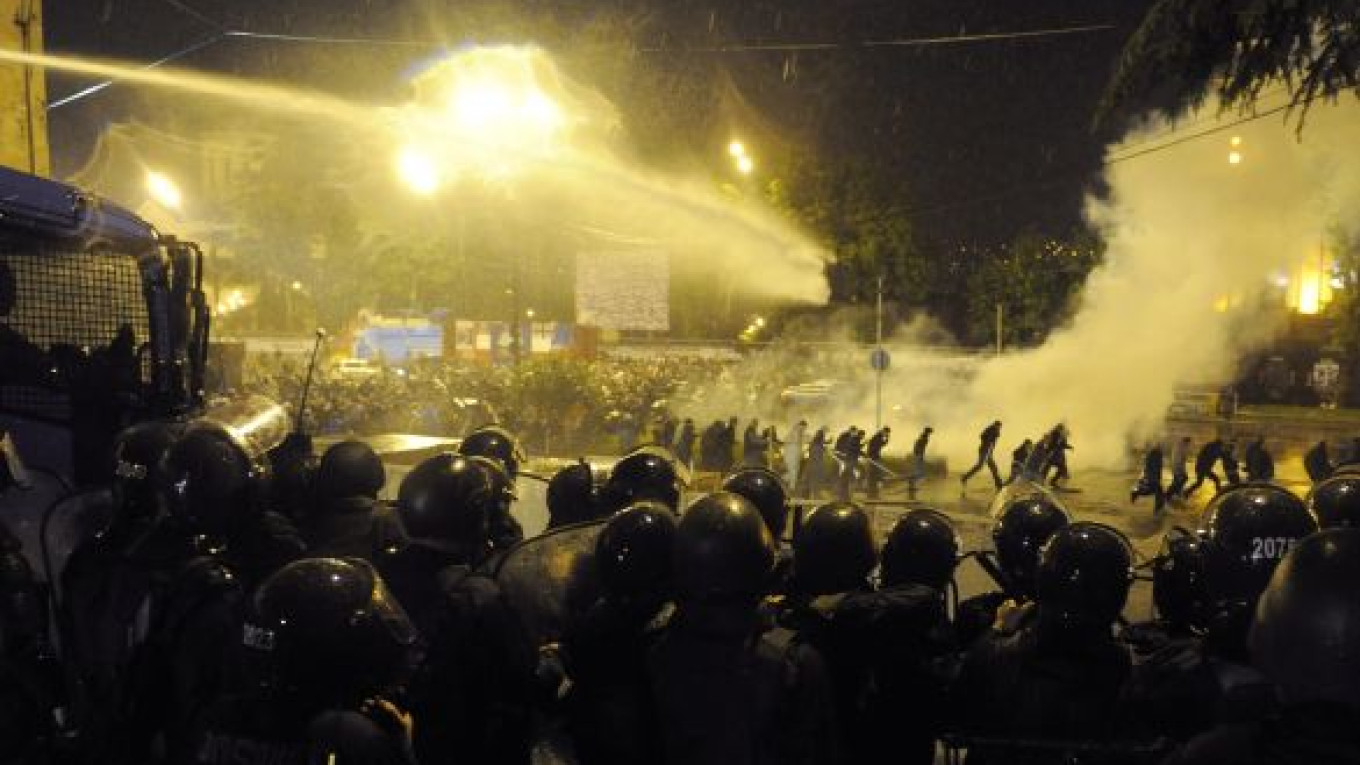TBILISI, Georgia — Georgian riot police on Thursday ended five days of demonstrations against President Mikheil Saakashvili, who blamed Russia for the protests, and two people were hit and killed by cars leaving the scene of the clashes.
Thousands of riot police used teargas, water cannon and rubber bullets to disperse protesters outside parliament in torrential rain just after midnight to clear the way for a military parade celebrating the country's independence.
At least 37 people were injured. Some protesters were beaten by police with batons, and a Reuters correspondent and photographers saw people smeared in blood lying restrained on the street. Some protesters wielded metal poles and sticks.
Saakashvili, whose country fought a brief war against Russia in 2008, pointed the finger at Moscow in a speech during the military parade outside parliament.
"It was an attempt to hold protests in accordance with a scenario written outside Georgia and sought to thwart Independence Day celebrations, cause sabotage and mass disorder in the country," Saakashvili said.
"This day was chosen as a target by our occupiers," he said in a clear reference to Russia, which maintains thousands of troops in Georgia's breakaway regions of South Ossetia and Abkhazia and recognized them as independent countries after the 2008 conflict.
Standing at the site where the protest was dispersed, Saakashvili addressed 6,000 armed servicemen in crisp new uniforms. Dozens of new armored personnel carriers rolled by, and military planes flew overhead.
Streets leading to venue were closed.
Saakashvili has repeatedly accused Russia of seeking to undermine him and his country. His remarks may have been aimed in part at prominent opposition leader Nino Burjanadze, who has visited Russia and met senior officials.
A wave of protests in 2009 failed to dislodge Saakashvili, and opponents mounted a new challenge this week, calling for his resignation in demonstrations.
About 5,000 people protested on Wednesday, and riot police moved in after hundreds refused to clear the area for the parade.
Interior Ministry spokesman Shota Utiashvili said one policeman and a protester were hit and killed by vehicles in a convoy leaving the scene. He said one car carried Burjanadze; she denied it.
Burjanadze, a former ally of Saakashvili's who has vowed to lead a peaceful revolution against him, said the cars did not belong to her. She called for an investigation and said she would continue to press for Saakashvili to quit.
"It was a crime against humanity," said Burjanadze, a former parliament speaker and one of the leaders of the 2003 Rose Revolution that brought Saakashvili to power.
A Russian Foreign Ministry spokesman called the police action a "glaring violation of human rights and freedoms" but did not comment on Saakashvili's allegation of Russian involvement. Human rights watchdogs said police used excessive force.
"Even if the Tbilisi demonstration was unauthorized, nothing can justify the beating of largely peaceful protesters," said Rachel Denber, regional deputy director for Human Rights Watch.
Political analysts said that as long as the opposition was fragmented, there was little threat to Saakashvili, whose term is due to end in 2013.
A Message from The Moscow Times:
Dear readers,
We are facing unprecedented challenges. Russia's Prosecutor General's Office has designated The Moscow Times as an "undesirable" organization, criminalizing our work and putting our staff at risk of prosecution. This follows our earlier unjust labeling as a "foreign agent."
These actions are direct attempts to silence independent journalism in Russia. The authorities claim our work "discredits the decisions of the Russian leadership." We see things differently: we strive to provide accurate, unbiased reporting on Russia.
We, the journalists of The Moscow Times, refuse to be silenced. But to continue our work, we need your help.
Your support, no matter how small, makes a world of difference. If you can, please support us monthly starting from just $2. It's quick to set up, and every contribution makes a significant impact.
By supporting The Moscow Times, you're defending open, independent journalism in the face of repression. Thank you for standing with us.
Remind me later.


